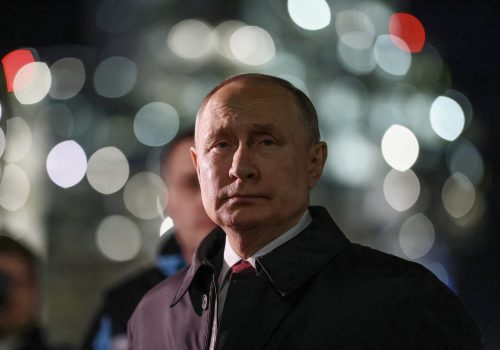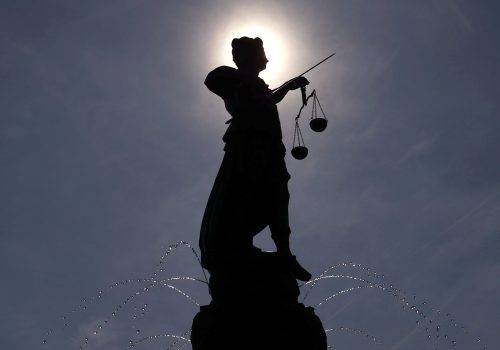Declaring things to make them real: 75 years of the Universal Declaration of Human Rights
Sometimes we declare things to make them real. Charles Malik did that as he led the drafting committee for the Universal Declaration of Human Rights (UDHR). Malik was a philosophy professor-turned-diplomat as he served as Lebanon’s ambassador to the United Nations. He believed that individuals possessed human dignity and that he could declare the principles of natural law following the atrocities of two world wars to propel governments forward.
Although history properly credits former First Lady Eleanor Roosevelt with exercising political influence to accomplish the passage of the UDHR in 1948, it was Malik who had the pen and wrestled with the game-changing ideas. December 10, 2023, is the seventy-fifth anniversary of the UDHR, a perfect opportunity to measure its impact and acknowledge that some declared rights are still only aspirational for many. The UDHR calls countries to what they are becoming and offers a clear standard by which we can measure nations.
Here are seven lessons to consider from this remarkable document on its seventy-fifth anniversary:
1. The world can find uncommon agreement on a controversial idea
Due to perpetual manufactured outrage and legitimate global conflicts, the world feels more divided than ever. During this current season of discord, it is encouraging to remember that all 192 member states of the United Nations have signed on to the Universal Declaration of Human Rights. This stunning display of unanimity is rare and particularly uncommon among controversial ideas. Malik took on big ideas and the UDHR picked sides in many contentious worldview battles. People and governments should find shade and comfort under the agreed principles of the UDHR and expand its common ground for the common good.
2. “Inherent” and “inalienable” are powerful concepts
The UDHR’s preamble deems all thirty of the articulated rights “inherent” and “inalienable.” Although most people do not use these terms regularly, they are solemn and meaningful. “Inherent” conveys the idea that an individual’s rights are not dependent on their performance, accomplishments, ability, wealth, or status. Neither governments nor cultures bestow or grant our rights. Likewise, we cannot be “alienated” or separated from our rights. The UDHR even states that the will of these inherently valuable people “shall be the basis of the authority of government.” In the aftermath of two world wars, Malik led the drafters with these twin concepts of “inherent” and “inalienable” that elevate the value of individuals over governments, cultures, and traditions.
3. The UDHR was the foundation of future anti-discrimination laws
The UDHR took aim at the classifications that historically provided the foundation of state-sanctioned discrimination:
“Everyone is entitled to all the rights and freedoms set forth in this Declaration, without distinction of any kind, such as race, colour, sex, language, religion, political or other opinion, national or social origin, property, birth or other status.”
This was a direct attack on the caste system in India, Jim Crow laws in the United States, and the genocide of Armenians, among many other injustices. Malik drew inspiration from the concept of imago Dei and believed that if God’s image was in every person, then one cannot allow racism, gender discrimination, and xenophobia to exist. Sixteen years after its adoption, the UDHR’s language and structure influenced the United States Civil Rights Act, which prohibits discrimination with a similar refrain: on the basis of “race, color, religion, sex or national origin.”
4. The legal consensus against human trafficking still needs stronger enforcement
The UDHR’s Article 4 demands that governments stop enslaving people and move to prohibit human trafficking. The good news is that legislatures around the world have passed laws prohibiting coercing people to work or engage in commercial sex acts. Since 2000, every country in the world has passed some sort of law against modern slavery. The world should celebrate this legal consensus for freedom.
Yet, the United Nations estimates that traffickers are currently enslaving 27.6 million people and raking in $150.2 billion annually from their crimes. Even more troubling, the US State Department has determined that eleven governments (that have ratified the UDHR) are trafficking their own people, including China, North Korea, and Cuba. Malik’s declaration of freedom resulted in much better national laws that governments inconsistently implement.
5. Both religious expression and conversion deserve protection
Malik also elevated the right to “thought, conscience, and religion.” Not only does the UDHR specifically embrace a right to individual and corporate religious expression, it also highlights the right to change religions. Inquisitions, faith-based tests, and anti-conversion laws stand in stark relief to the towering religious freedom protections of the UDHR.
Meanwhile, the US State Department’s most recent International Religious Freedom Report designates twelve governments as “Countries of Particular Concern” because they “engaged in or tolerated ‘particularly severe violations of religious freedom.’”
6. Families are central to a free, rights-driven society
Across continents and cultures, the UDHR declares that the “fundamental group unit of society” is the family. Marriages require consent of both adult spouses, and both have equal rights when marriages dissolve. The UDHR even directs that parents have the right to determine how their children are educated. Malik’s emphasis on uniquely valuable people connected in intermediate institutions, such as the family and community structures, won the day over two competing philosophies: 1) the communist’s government-centric and anti-family construction; and 2) an emerging Western society of individuals prioritizing their own self-interest.
Yet today, twelve million girls under eighteen years old are married every year. That means twenty-eight girls every minute become child brides. Some advocates argue that governments that do not provide equal legal rights for both spouses lead to increased “marital rape, forced pregnancy, and domestic violence.” In many nations, the declared “fundamental group unit of society” needs additional practical protections.
7. The freedom to choose one’s leaders is a human right—one that needs more vigilance than ever
Drawing from a democratic tradition and the Enlightenment, Malik and the drafters included a litany of political rights in the UDHR. These include the right to assemble, freedom of expression, a free press, public impartial trials, and a presumption of innocence. Arbitrary arrest and torture are prohibited. The UDHR even weighed in on the necessary form of government, with a dramatic embrace of democracy. Article 21 states:
“The will of the people shall be the basis of the authority of government; this will shall be expressed in periodic and genuine elections which shall be by universal and equal suffrage and shall be held by secret vote or by equivalent free voting procedures.”
Despite the UDHR’s clarity, Freedom House’s most recent Freedom in the World report found that 80 percent of the world’s population does not live in a free country.
The rights declared in the UDHR have stood the test of time and are as meaningful today as ever before. Kudos to Malik and his fellow diplomats, who laid down a clear statement that continues to guide the flawed nations of Earth like a north star as they navigate the complicated intersections of human rights, national security, and economic prosperity. We must keep declaring these noble ideas to make them real.
John Cotton Richmond is a nonresident senior fellow at the Scowcroft Strategy Initiative of the Atlantic Council’s Scowcroft Center for Strategy and Security. He served as the US ambassador to monitor and combat trafficking in persons from 2018 to 2021. Follow him on X, formerly Twitter, @JohnRichmond1.
Further reading
Thu, Nov 30, 2023
Putin has been accused of starving civilians as a warfare tactic. Will the ICC agree?
New Atlanticist By Alana Mitias, Celeste Kmiotek
New evidence about Russia’s actions in Ukraine offers the ICC an opportunity to prosecute starvation as a war crime or crime against humanity affecting Ukrainians and other global victims.
Thu, Oct 5, 2023
International avenues to hold the Islamic Republic of Iran accountable for human rights violations
Report By Lisandra Novo, Celeste Kmiotek, Elise Baker, Gissou Nia
The Islamic Republic of Iran’s discriminatory domestic legal framework and brutal suppression of dissent have left Iranians looking for international responses to their plight. This report aims to provide an overview of and recommendations relating to international avenues for accountability for atrocity crimes and human-rights violations committed in Iran.
Fri, Jun 16, 2023
Less than half of 1 percent of human trafficking victims are identified. That needs to change.
New Atlanticist By John Cotton Richmond
The US Department of State just published its latest Trafficking in Persons Report, but the number of identified victims is a rounding error of the total global estimated victims.
Image: Dr. Charles Malik (left), of Lebanon, Rapporteur of UN Commission on Human Rights, talks to a group of theological students from the Hartford Seminar Foundation, visiting the UN Interim Headquarters, at the Human Rights Exhibition. UN Photo.


